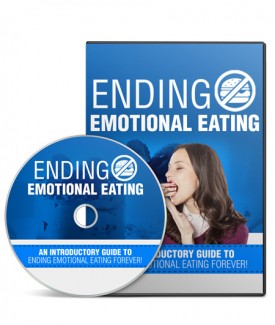 License Type: Master Resell Rights
License Type: Master Resell Rights  File Size: 52,476 KB
File Size: 52,476 KB File Type: ZIP
File Type: ZIP
 SKU: 54818
SKU: 54818  Shipping: Online Download
Shipping: Online Download
Ebook Sample Content Preview:
Chapter 5 - Alternative Therapies for Emotional Overeating
Emotional overeating can make a person feel imprisoned - it can seem like there is no way out of the cycle of feeling sad, angry, anxious and so forth, and then eating to alleviate the emotional pain. There are treatments that are available, though - some of them conventional and some of them alternative.
Conventional therapy, surgery, and medication have all been utilized at one time or another for the treatment of emotional overeating. There are, however, some alternative therapies that are worth exploring. Here are some of them.
Hypnosis
Because emotional overeating begins in the mind, hypnosis is said to be effective because it addresses the mind directly with the power of suggestion. Hypnosis is not the mumbo-jumbo stuff of cartoons and swinging pocket watches; it's a clinical practice and many practitioners have used it with success to treat emotional overeating.
Meditation
The intent of meditation as a treatment for emotional overeating is to "tune in" to the emotional thought center that is driving your cravings and/or binge eating. Meditation, sometimes taking a form called "mindfulness," is the opposite of mindLESSness, which is what often happens in emotional overeating. The person does not really think about what he or she is doing; it's mindless eating.
Herbal Supplements
It seems like every time you turn around there's a new herbal supplement promising to help you lose weight. But there are some herbs that can help with the issue of emotional overeating. Here are some of them.
Hoodia - This much-publicized herb is said to be effective at appetite suppression and boosting energy. Its effects tend to be subtle, and it also has a good safety record.
Vitex - This hormone-balancing herb for women may help those whose emotional overeating is influenced by hormone fluctuations.
Ginseng - This ancient herb is said to help sugar cravings and curb the compulsion to overeat in response to one's emotions.
Both American and Asian ginseng are purported to be equally effective.
Acupuncture
Acupuncturists are often asked if acupuncture can help with weight loss. The answer, in general, is yes - but not always. However, the good news is that acupuncture tends to be more successful with treating emotional overeating than just overeating. This may be due to acupuncture's alleged ability to release endorphins and boost metabolism - making the client feel better emotionally, effectively curtailing the emotional overeating.
Nutrition
As we've covered, having the right balance of vitamins and minerals may affect emotional overeating - it's not too much of a stretch to speculate that nutritional deficiencies could play a part in this kind of overeating. So make sure you're not eating a lot of artificial, processed, pre-packaged foods; opt for fresh, whole foods as a general rule. It's also a good idea to take a vitamin and mineral supplement that is formulated for your gender and life situation. In the next chapter we will look at weight loss surgery and whether it is a viable option in overcoming emotional eating.
Chapter 6 - Weight Loss Surgery: Can It Help with Emotional Overeating?
If you have trouble with emotional overeating, you may have considered weight loss surgery of some sort. But how do you know if it's for you? What kinds of surgery options are available? Here are some ideas as to the more common surgical options currently available and some of the better-known pros and cons associated with them.
1.Lap-Band
This is a type of restrictive weight loss surgery, and it is adjustable. A silicon doughnut or ring is placed around the top of the stomach, leaving a small pouch above the ring. This is where the food goes first, and the pouch, being so small, fills up quickly. The person feels full on less food, in other words. Slowly, the food makes its way from the pouch into the main stomach.
The doctor or surgeon may, from time to time, inject saline into the ring in order to inflate it, thus decreasing the pouch's capacity even further. The opposite can be done as well.
Pros:
It's adjustable, as noted above - fluid can be removed or injected into the ring.
The digestive process is not compromised; food is digested "the usual way."
The surgical procedure is usually done laproscopically, meaning it's minimally invasive.
Cons:
Additional surgery may be required in the case of twisting of the access port or perforation of the stomach.
Weight loss tends to be rather slow and gradual, and not as dramatic as some other options.
Repeated follow-up visits with your doctor are required.
2. Gastric Bypass
This is what's known as a malabsorptive technique. In gastric bypass surgery, a small pouch is created at the top of the stomach using "staples" rather than a ring. Then part of the small intestine is re-routed to connect to this pouch, essentially creating a permanently smaller stomach. It is called "bypass" surgery because food bypasses the rest of the stomach and the original small intestine connection, called the duodenum.
Pros:
Weight loss tends to be significant and permanent.
Mild side effects, such as heartburn, tend to be resolved easily.
Cons:
Compromised nutrient absorption is a significant concern, and patients are generally required to take many supplements to prevent nutritional deficiency.
Dumping syndrome, or a too-fast emptying of stomach contents, is a potentially difficult side effect.
It's harder for doctors to view the stomach and intestine via endoscopy, meaning cancer and other problems may go undetected.
These are just two of the more common types of weight loss surgery. The bottom line is, weight loss surgery can help with the weight gain and excessive caloric intake associated with emotional overeating, but it does not address the underlying emotional issues. If you do choose some sort of surgery to treat emotional overeating, it's a good idea to make sure it's part of a "whole person" treatment plan that includes counseling and emotional therapy.
- File Size:52,476 KB
- License: Master Resell Rights
- Category:Ebooks
- Tags:2015 Ebooks With Audio Master Resale Rights








